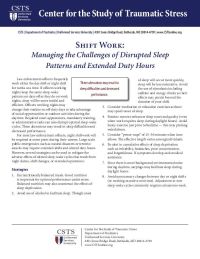Shift Work: Managing the Challenges of Disrupted Sleep Patterns and Extended Duty Hours
Law enforcement officers frequently work either the day shift or night shift for weeks at a time. If officers working nights keep the same sleep-wake patterns on days off as they do on work nights, sleep will be more restful and efficient. Officers working nights may change their hour on off-duty days to take advantage of social opportunities or outdoor activities during day time. Required court appearances, mandatory training, or administrative tasks can also disrupt optimal sleep-wake cycles. These alterations may result in sleep difficulties and decreased performance.
For most law enforcement officers, night shift work will be required for some periods during their careers. Large scale public emergencies such as natural disasters or terrorist attacks may require extended shifts and altered duty hours. However, several strategies can be used to mitigate the adverse effects of altered sleep-wake cycles that result from night duties, shift changes, or extended operations







